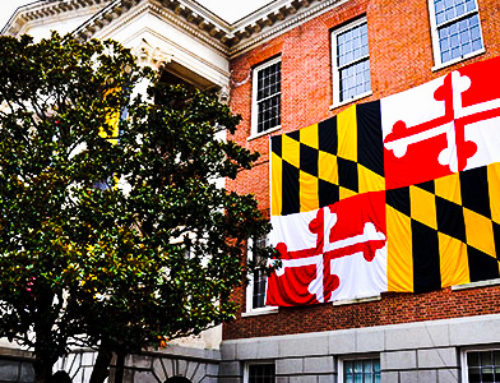View by Topic
Recent Articles
-
New Environmental Laws from the 2025 Maryland Legislative SessionSaturday, April 26th, 2025
-
Migratory Bird Treaty Act Does Not Prohibit Incidental Take – AgainSaturday, April 19th, 2025
-
President Trump’s Bold Step to Rein in State Overreach in Climate ChangeSaturday, April 12th, 2025
-
Mandatory GHG Disclosures in Maryland Real Estate ContractsSaturday, April 5th, 2025
View by Month/Year
“Green Building Law Update” Headlines
Recent Articles & News from
Stuart Kaplow’s blog
at GreenBuildingLawUpdate.com
- BEPS Redux: The Most Far Reaching Environmental Legislation of the 2025 Maryland General Assembly May 4, 2025
- New Environmental Laws from the 2025 Maryland General Assembly Session April 27, 2025
- Migratory Bird Treaty Act Does Not Prohibit Incidental Take – Again April 20, 2025
- President Trump’s Bold Step to Rein in State Overreach in Climate Change April 13, 2025
Subscribe to the Green Building Law Update!
Stuart Kaplow brings his expertise and extensive experience to the table with his unique digital publication, "Green Building Law Update". Subscribers receive regular updates to keep them informed about important issues surrounding Environmental Law, Green Building & Real Estate Law, as well as the emerging demand for Environmental Social Governance (ESG).
Get fresh content through the lense of Stuart Kaplow's cutting-edge expertise, innovative commentary and insider perspective. Don't miss another issue! Subscribe below.
Checklist of Required Real Estate Contract Provisions in Baltimore County, Maryland
The recodification of the Baltimore County Code, effective July 1, 2004, altered the language that must be contained in a contract of sale for real property.
Contract forms should be updated for risk that the writing will now be voidable by a prospective purchaser. Moreover, a person who violates these several provisions of the County Code may be “guilty of a misdemeanor and on conviction is subject to a fine not exceeding $1,000 or imprisonment not exceeding 30 days or both.”
Accepting that real estate is one of the most heavily regulated industries, there are federal, state, and local government requirements as to language that must be contained in a contract of sale for real property, and in particular in a contract involving residential property. This article addresses only the requirements imposed by Baltimore County:
1. Historic Property. The seller of any property that appears on the preliminary landmarks list, the final landmarks list, or is located within any proposed or designated historic district must, pursuant to § 32-7-107 of the Baltimore County Code, disclose in writing to the buyer before the execution of a contract of sale that the property is on either of the landmark lists, is located within an historic district, or is both on a list and located in an historic district.
2. Panhandle Lot. A property owner must, if the property lot is a panhandle lot as defined under § 32-4-101 of the County Code, include the following notice, in a contract for the sale of the property: That (a) “the property is a panhandle lot;” and (b) “the county is not responsible for maintaining the road, removing snow, or providing trash collection along the panhandle driveway.”
3. RC 4 Zoning District. A property owner must, as required by § 35-3-303(b) of the County Code, include the following notice, as applicable, in a contract for the sale of real estate in or within 500 feet of any RC 4 zone:
“(a) The property may be subject to inconveniences or discomforts arising from agricultural operations, including: (i) Operation of machinery of any kind including aircraft, during any 24-hour period; (ii) The storage and disposal of manure; and (iii) The application by spraying or otherwise of chemical fertilizers, soil amendments, herbicides, and pesticides; and
(b) The county will not consider an agricultural operation to be a public or private nuisance if the operation: (i) Complies with all federal, state, or county health and zoning requirements; and (ii) Is not being conducted in a negligent manner.”
4. Master Plan. At the time of signing a contract for the sale of real property that is zoned for residential use, § 35-3-301 of the County Code requires that the seller notify the prospective buyer that:
“(1) The seller has notified the buyer that the property may be affected by provisions of the master plan and that the buyer may wish to review the master plan; and
(2) The buyer understands that in order to become fully informed of current and future land use plans, facility plans, public works plans, school plans, or other plans affecting the property or area, the buyer should consult the appropriate county agency for information regarding the plans.”
This provision must be in bold within the body of the contract or within an addendum.
5. 100-Year Floodplain. Pursuant to § 32-8-208 of the County Code the following clause must appear in any contract of sale or resale of a house, building, or other structure that has been removed from a 100-year floodplain area: “The house, building or structure which is the subject of this contract ______ has, or ______ has not (Seller initial one) been removed from a 100-year floodplain.”
6. Not Served by Public Utilities. A property owner must, as required by § 35-3-303 of the County Code, include the following notices, as applicable, in a contract for the sale of the property, if the property is not served by a public sewer or water supply system, the notice shall state:
“a. That the property ______ is, or is not ______ (Seller initial one) not served by a public sewer or ______ is, or is not ______ (Seller initial one) served by a water supply system; and b. That the property ______ is, or is not ______ (Seller initial one) equipped with a private sewer or ______ is, or is not ______ (Seller initial one) equipped with a private water supply.”
7. Private Fees for Public Water or Sewer. Each contract for the sale of real property in Baltimore County served by public water or sewer facilities that is subject to an annual fee or assessment, as provided for in § 32-4-310 of the County Code, must contain a notice to the buyer in the following form:
“This property is subject to a fee or assessment charged, under the authority granted to developer pursuant to § 32-4-310 of the Baltimore County Code, which purports to cover or defray the cost of installing all or part of the public water or sewer facilities constructed by the developer of the subdivision known as _____. This fee or assessment is $ _____, payable annually in the month of _____ to _____ (name and address) (hereinafter called ‘lienholder’) until _____ (date). There may be a right of prepayment or discount for early payment which may be ascertained by contacting the lienholder. The fee and assessment is a contractual obligation between the lienholder and each owner of this property, that runs with the land, and is not in any way a fee or assessment of Baltimore County.”
8. Notice of Well Water Law. Depending upon whether the real estate to be conveyed is an unimproved lot or an improved lot, one of two forms of notice to the buyer is required by § 34-2-103 of the County Code. If an unimproved lot, the notice of well water law must provide:
“Since the property to be purchased by buyer(s) will be served by a private water supply system as the source of domestic water, the law of Baltimore County requires that, prior to conveyance of such property to any buyer(s), seller(s) must provide a well with a supply of water meeting the minimum water yield requirements of § 34-2-102(a) of the Baltimore County Code. Buyer is further advised that the quantity of water is important and that, unless buyer(s) specifically executes a “waiver of provision of minimum well yield prior to conveyance,” a well meeting the Baltimore County Code standards is required. Any waiver of this requirement must be filed by buyer(s) on a form prescribed by the Baltimore County Code and filed with the Department of Environmental Protection and Resource Management at least six (6) days prior to settlement and/or the date of conveyance to buyer(s), whichever shall first occur. Any such waiver may be revoked by buyer(s) upon written notice of such revocation delivered or mailed by certified mail, postage prepaid, return receipt requested, to seller(s) or seller’s(s’) agent at seller’s(s’) home or business address or the business address of seller’s(s’) agent within five (5) days of the date of the aforesaid filing with the Department of Environmental Protection and Resource Management. Date of delivery includes the date of mailing as aforesaid.”
9. Waiver of Minimum Well Yield. Purchasers of real estate may execute an addendum to a contract of sale waiving the statutorily adopted minimum per minute yield of water from a well. The County Code provides both a version for an unimproved lot and an improved lot. The addendum for an unimproved lot must provide:
“Buyer(s) hereby acknowledges that buyer(s) is aware that the property buyer(s) intends to purchase will be served by a private water supply system as a source of domestic water, that water quantity is most important for residential use of property, that § 34-2-102(a) of the Baltimore County Code requires seller(s) to provide a well with a supply of water meeting certain minimum water yield requirements, and that a building permit will not be issued for construction of a residence on any lot not served by a public or community water supply system unless it has a well which meets the required minimum water yield. Nevertheless, buyer(s) specifically elects to waive the requirement that a well must be provided which satisfies the yield requirements of the Baltimore County Code prior to settlement and/or the date of conveyance to buyer(s), whichever shall first occur; and buyer(s) elects to accept conveyance of the property located at _____ consisting of _____ acres without a well as provided by law, and knowingly and voluntarily executes this waiver on this _____ day of _____, 2______.”
10. Waiver of Chemical Quality Test. Contracts of sale for improved lots may also contain a provision waiving the mandated well water quality test. Again, the County Code provides the express language of such a waiver:
“Buyer(s) hereby acknowledges that buyer(s) is aware that the property buyer(s) intends to purchase will be served by a private water supply system as a source of domestic water, that water quality is most important for residential use of property, and that § 34-2-102(b) of the Baltimore County Code requires seller(s) to provide a well with a supply of water meeting certain chemical quality standards. Nevertheless, buyer(s) specifically elects to waive the requirement that the well on the property which buyer(s) intends to purchase must be tested to determine whether same satisfies the chemical quality standards of the Baltimore County Code prior to settlement and/or the date of conveyance to buyer(s), whichever shall first occur; and buyer(s) elects to accept conveyance of the property located at _____ consisting of _____ acres without the chemical quality test provided by law, and knowingly and voluntarily executes this waiver on this _____ day of _____, 2_____.”
This compilation is only of matters mandated to be included within a contract of sale and does not include other Baltimore County mandates for owners of real estate, including the requirement that owners of certain residential rental properties register within fifteen days of purchase with the County.
Beyond the scope of this compilation of Baltimore County requirements, be aware there are federal and state lead paint disclosures, state disclaimers or disclosures with respect to the condition of a property, state forest conservation notices, and a host of other provisions that may be required to be contained within a particular contract of sale for real estate or the parties risk that the contract may be voidable.
This article is simply intended as a checklist of issues that should be considered by a seller or purchaser of real estate in Baltimore County in advance of consulting with an attorney about the form of contract.









